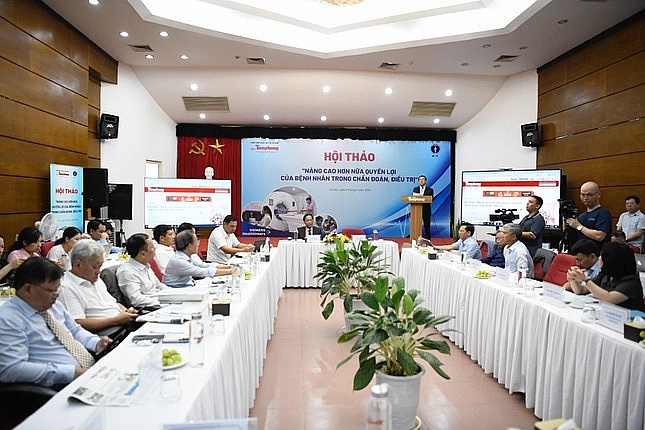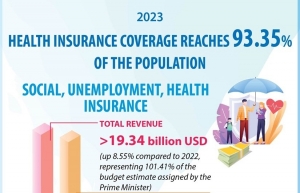Revisions to Law on Health Insurance may mean free medical treatment
This was revealed by Prof. Dr. Tran Van Thuan, Deputy Minister of Health, at a workshop held in Hanoi on May 8. The plan is to gradually realise two policies; regular health check-ups at least once a year and a move towards universal free hospitalisation.
 |
| Photo: MoH |
It is expected that amending the entire Law on Health Insurance will focus on exam and treatment for patients, especially screening and early detection of dangerous diseases.
According to the Ministry of Health (MoH), the legal framework for healthcare is constantly being updated, notably the promulgation of the Law on Medical Examination and Treatment, the Law on Health Insurance, and the revised Law on Pharmacy.
Moreover, the quality of health services continues to improve, both in terms of expertise and service procedures. The hospital system is expanding, with the capacity of grassroots medical facilities strengthened and advanced technology being widely transferred.
With health insurance coverage now exceeding 94 per cent, patient costs, particularly for vulnerable populations, have dropped substantially
Deputy Minister Tran Van Thuan spoke of how the digital transformation process in the healthcare sector has made many important strides, with four shared digital healthcare platforms completed, widespread use of electronic medical records, and the deployment of remote treatment helping shorten access time, increase transparency, and improve the effectiveness of diagnosis and treatment.
The deputy minister, however, admitted that shortcomings remain. The lack of data synchronisation has lead to duplicate testing and diagnosis, resulting in unnecessary costs and affecting the quality of treatment.
Furthermore, while Vietnam's health insurance system has advanced, the coverage list for drugs, medical supplies, and treatments has yet to evolve alongside recent innovations.
"These shortcomings pose an urgent requirement to fully and substantially ensure the rights of patients, not just in clinical expertise and techniques, but also in institutional frameworks, social equity, and medical ethics. The healthcare sector is making great efforts to gradually overcome these limitations," said Thuan.
Dr. Pham Ngoc Dong, director of the Central Eye Hospital shared his view that considering more than 90 per cent of citizens now have health insurance, exams and treatment should be covered.
"The current system calculates premiums based on the basic salary, which is already very low, instead of actual income. This approach limits funding and access," said Dong.
 | USABC ready to help Vietnam improve health insurance policies: Official Member businesses of the US-ASEAN Business Council (USABC) always stand ready and want to implement projects and provide resources to help Vietnam improve its health insurance policies and medical system, said Michael Michalak, Senior Vice President and Regional Managing Director of USABC. |
 | Insurance industry forecasts less favourable year in 2022 Hanoi - After gaining high growth last year, the insurance industry is forecast to experience a less favourable time in 2022 as many insurers have so far planned lower profit targets or slowing growth compared to last year. |
 | Health insurance coverage reaches 93.35 per cent of population Vietnam Social Security (VSS) has completed or surpassed all targets regarding the coverage of social, unemployment, and health insurance. In particular, health insurance coverage reached 93.35 per cent of the population, exceeding the requirement set out in Resolution No 01/NQ-CP dated January 6, 2023, from the Government by 0.15 per cent. |
What the stars mean:
★ Poor ★ ★ Promising ★★★ Good ★★★★ Very good ★★★★★ Exceptional
Themes: Healthcare Platform
- Hanoi intensifies airport monitoring amid Nipah disease risks
- Cosmetics rules set for overhaul under draft decree
- Policy obstacles being addressed in drug licensing and renewal
- Sanofi, Long Chau Pharmacy relaunch medicine blister pack collection initiative
- Takeda Vietnam awarded for ongoing support of Vietnam’s sustainability efforts
Related Contents
Latest News
More News
- Hanoi intensifies airport monitoring amid Nipah disease risks (January 29, 2026 | 15:21)
- 14th Party Central Committee unanimously elects To Lam as General Secretary (January 23, 2026 | 16:22)
- List of members of 14th Party Central Committee announced (January 23, 2026 | 09:12)
- Highlights of fourth working day of 14th National Party Congress (January 23, 2026 | 09:06)
- Press provides timely, accurate coverage of 14th National Party Congress (January 22, 2026 | 09:49)
- Press release on second working day of 14th National Party Congress (January 22, 2026 | 09:19)
- Minister sets out key directions to promote intrinsic strength of Vietnamese culture (January 22, 2026 | 09:16)
- 14th National Party Congress: Renewed momentum for OVs to contribute to homeland (January 21, 2026 | 09:49)
- Party Congress building momentum for a new era of national growth (January 20, 2026 | 15:00)
- 14th National Party Congress’s opening: Great aspirations, steady steps (January 20, 2026 | 09:50)

 Tag:
Tag:


























 Mobile Version
Mobile Version